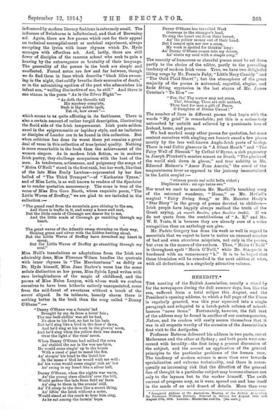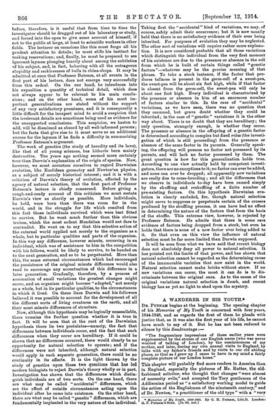HEREDITY.*
THE meeting of the British Association, usually a stand-by for the newspapers during the dull summer days, has, like the sun, suffered from a total eclipse this August, and the President's opening address, to which a full page of the Times is regularly granted, was this year squeezed into a single paragraph and relegated to a botch-potch column of miscel- laneous "news items." Fortunately, however, the full text of the address may be found in another of our contemporaries, Nature, and its readers will easily assure themselves that it was in all respects worthy of the occasion of the Association's first visit to the Antipodes.
Professor Bateson delivered his address in two parts, one at Melbourne and the other at Sydney ; and both parts were con- cerned with heredity—the first being a general discussion of the subject, and the second an application of the general principles to the particular problems of the human race. The tendency of modern science is more than ever towards specialization and extreme technicality, and there is conse- quently an increasing risk that the direction of the general line of thought in a particular subject may become obscure not only to the layman but to the worker himself. The swift current of progress may, as it were, spread out and lose itself in the sands of an arid desert of details. More than ever • Inaugural Address at the Australian Meeting of the British As, oCation By Professor William Bateson. Printed in Nature for August 20th and. August 27th, 1914. London : Maesollluu and Co. [9d. each.]
before, therefore, is it useful that from time to time the investigator should be dragged out of his laboratory or study, and forced into the open to give some account of himself, if not to the public at large, at least to scientific workers in other fields. The lecturer on occasions like this must forgo all his prudent attention to details; he must stifle his instinct for making reservations; and, finally, he must be prepared to see ignorant laymen plunging heavily about among the subtleties of his subject, and, in fact, behaving with all the outrageous stupidity and recklessness of bulls in china-shops. It may be admitted at once that Professor Bateson, at all events in the first part of his lecture, does not emerge very successfully from this ordeal. On the one hand, he introduces into his exposition a quantity of technical detail, which does not always appear to be relevant to his main conclu- sions ; and on the other hand, some of his most im- portant generalizations are stated without the support of any very satisfactory premisses, and it is consequently a little difficult for the inexpert mind to avoid a suspicion that the irrelevant details are sometimes being used as evidence for the unsupported conclusions. This suspicion, we hasten to add, will be dismissed as absurd by all well-informed persons; but the facts that give rise to it must serve as an additional excuse for the layman if he finds a difficulty in summarizing Professor Bateson's argument.
The work of genetics (the study of heredity and its laws), like that of all young sciences, has hitherto been mainly destructive. Ten years ago nothing seemed more certainly true than Darwin's explanation of the origin of species. Now, however, we must accustom ourselves to regard Darwinian evolution, like Euclidean geometry and Newton:an physics, as a subject of merely historical interest; and it is with a criticism of Darwin's theory of evolution, effected by the agency of natural selection, that the first part of Professor Bateson's lecture is chiefly concerned. Before giving a rough-and-ready account of this criticism we must restate Darwin's view as shortly as possible. More individuals, he held, were born than there was room for in the world, and in the struggle for life which resulted from this fact those individuals survived which were best fitted to survive. But he went much further than this obvious truism, which the most ardent Mendelian would not dare to contradict. He went on to say that this selective action of the external world applied not merely to the organism as a whole, but to particular qualities and parts of the organism. In this way any difference, however minute, occurring in an individual, which was of assistance to him in the competition with his fellows, would be likely to survive, to be handed on io the next generation, and so to be perpetuated. More than this, the same external circumstances which had encouraged the persistence of the original minute difference would also tend to encourage any accentuation of this difference in a later generation. Gradually, therefore, by a process of summation of small variations the greatest changes might occur, and an organism might become "adapted," not merely as a whole, but in its particular qualities, to the circumstances in which it lived. On these lines Darwin and his followers believed it was possible to account for the development of all the different sorts of living creatures on the earth, and all their most minute differences of structure.
Now, although this hypothesis may be logically unassailable, there remains the further question whether it is true in fact. It will be seen that at the root of the Darwinian
hypothesis there lie two postulates—namely, the fact that differences between individuals occur, and the fact that such
differences when they occur are hereditary. If it could be shown that no differences occurred, there would clearly be no opportunity for natural selection to operate; and if the differences were not inherited, although natural selection
would apply in each separate generation, there could be no continuity in its effects. It is the light thrown by the study of genetics upon these two questions that has led
modern biologists to reject Darwin's theory wholly or in part. Investigation has shown that the differences which distin- guish individuals are of two sorts. On the one hand, there
are what may be called "accidental" differences, which are the effect of outside circumstances acting upon the individual after he came into existence. On the other band, there are what may be called "genetic" differences, which are fundamentally implanted in the very nature of the individual. Taking first the " accidental" kind of variations, we may, of course, safely admit their occurrence; but it is now usually held that there is no satisfactory evidence of their ever being inherited. For purposes of evolution they may be neglected. The other sort of variations will require rather more explana- tion. It is now considered probable that all those variations which distinguish the individual from the very first moment of his existence are due to the presence or absence in the cell from which he is built of certain things called "genetic factors "—whatever may be the precise meaning of that phrase. To take a stock instance, if the factor that pro- duces tallness is present in the germ-cell of a sweet-pea, the sweet-pea will be about six feet high, while if that factor is absent from the germ-cell, the sweet-pea will only be about one foot high. Every individual is characterized by the presence or absence in him of an enormous number of factors similar to this. In the case of "accidental" variations, as we have seen, there was no question that they occurred, but grave doubt whether they could be inherited ; in the case of " genetic " variations it is the other way about. There is no doubt that they are hereditary; the only question, strangely enough, is whether they occur. The presence or absence in the offspring of a genetic factor is determined according to complex but fixed ruins (the investi- gation of which is still proceeding) from the presence or absence of the same factor in its parents. Generally speak- ing, the offspring will possess no factor not possessed by its parents, and will lack no factor possessed by them. The great question is how far this generalization holds true. According to one view actually held by competent investi- gators, there are no exceptions to it; no factor can ever be added, and none can ever be dropped; all apparently new variations are really due to cross-breeding ; and all the differences that we observe in individuals to-day have been caused simply by the shuffling and reshuffling of a finite number of pre-existing factors. On this hypothesis Darwinian evo- lution is clearly excluded, for, though natural selection might serve to suppress or perpetuate certain of the crosses produced by the shuffling process, it can have had no effect in determining the nature of the factors that form the basis of the shuffle. This extreme view, however, is rejected by Professor Bateson. He admits that there is some rare evidence of factors being dropped from a stock, but even he holds that there is none of a new factor ever being added to it. So that even on this view the influence of natural selection must be far more limited than Darwin supposed.
It will be seen from what we have said that recent biology does not absolutely deny all power to natural selection. It has pointed out the limits of that power, and has shown that natural selection cannot be regarded as the determining cause of the innumerable varieties that now exist in the world. Natural selection cannot make bricks without straw. If no new variations can occur, the most it can do is to dis- criminate between the original ones. As to the cause of the original variations natural selection is dumb, and recent biology has as yet no light to shed upon the mystery.



































 Previous page
Previous page